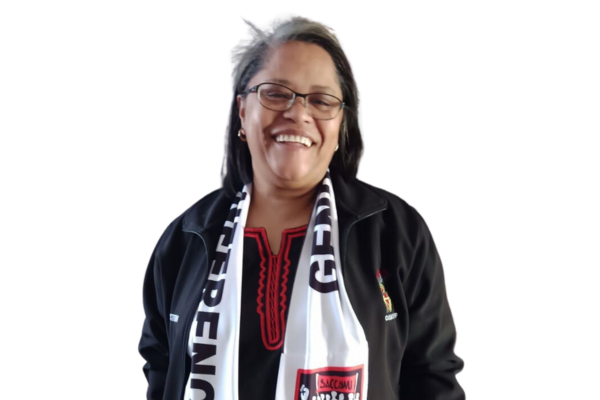Trade unions bargaining with South African multinationals have a key role to play in revealing the realities on the ground and sharing information across workplaces. The South African Commercial, Catering and Allied Workers Union (SACCAWU) is an example of how LRS member unions are getting better using information to win better bargaining outcomes for their members. Brenita Cloete, SACCAWU’s negotiator on Pick n Pay, recently spoke about why she believes LRS support is crucial to the union’s bargaining processes.
When did you first hear about the Labour Research Service (LRS)?
The South African Commercial, Catering and Allied Workers Union (SACCAWU) is a member of LRS. I was introduced to the LRS through previous study circles, which helped me to get started as a newly elected shop steward at SACCAWU. The study circles focused on various topics, including how to lead and the role of a shop steward. From such learning interventions, worker leaders have helped to shape organisational policies, strategies and resources. For example, we developed a childcare manual to help our union negotiate for childcare facilities at the workplace.
What challenges do you face as a worker representative?
I am part of the SACCAWU Pick n Pay bargaining team. One of the main challenges for union negotiators is to obtain adequate resources and information to prepare for negotiations. When we do find information, it is not always in a form that can be easily understood by every worker leader. This means that we risk entering bargaining processes on an unequal footing with the negotiating team of the company.
How do SACCAWU negotiators use the LRS resources and education support?
The LRS is the first port of call for our negotiating team when preparing for bargaining. The range of bargaining resources, including company and sector reports, are very useful and give us the edge needed to enter negotiations with confidence. SACCAWU is also part of UNI Global Union’s Shop Stewards Alliance Network in sub-Saharan Africa. The alliance network is supported by LRS with the capacity for bargaining with big South African retail companies and monitoring their activities in the countries they operate. We get up-to-date information on financial performance, bosses’ remuneration and expansion and technology strategies of retail companies through our participation in the Shop Stewards Alliance Network. The information is researched and presented in a way that we can easily understand. This has improved SACCAWU’s bargaining strategies and outcomes for our members.
Give a practical example of how LRS support has led to better bargaining outcomes for SACCAWU members
In 2022, Pick n Pay offered only R80 at the start of wage negotiations. The company cited the economic downturn exacerbated by Covid-19 and the looting in Durban, saying it could not afford anything close to the R400 increase it had offered workers the previous year.
I contacted the LRS and obtained invaluable information. As one of the largest employers, the retail sector is key and is closely monitored by LRS for retrospective company performance and executive remuneration analysis. In the light of the provided financial situation and executive remuneration of Pick n Pay, our negotiating team changed tack. The company-specific information helped our negotiators in formulating and building an argument for our wage demand. For example, we learned that Richard Brasher, the former CEO of Pick n Pay, received a golden handshake of R100 million. In addition, Brasher received a performance bonus of about R60 million. This information proved that the company’s claims that it had no money to pay workers were false. Pick n Pay increased its offer to R115 in the second round of negotiations, but we rejected the new offer. We presented additional information from the LRS proving that the company could afford the wage increase. In the end, we settled on a wage increase of R500, which was R420 more than the low initial offer of R80. The workers were happy, and we also managed to avoid striking!
In fact, one of the directors asked us where we got our information. I had to laugh because I couldn’t help thinking, “What era are you living in?” Now union negotiators have access to information, support and financial literacy to enable us to read and interpret company financial reports. We also actively share information in real-time on our social networks and other channels.
Watch this video for more insight into the Pick n Pay Group.
Get the PDF version of this video presentation.
ONLINE TOOLS FOR WORKERS
RELATED ARTICLE
Time for transparency on executive pay in South Africa







